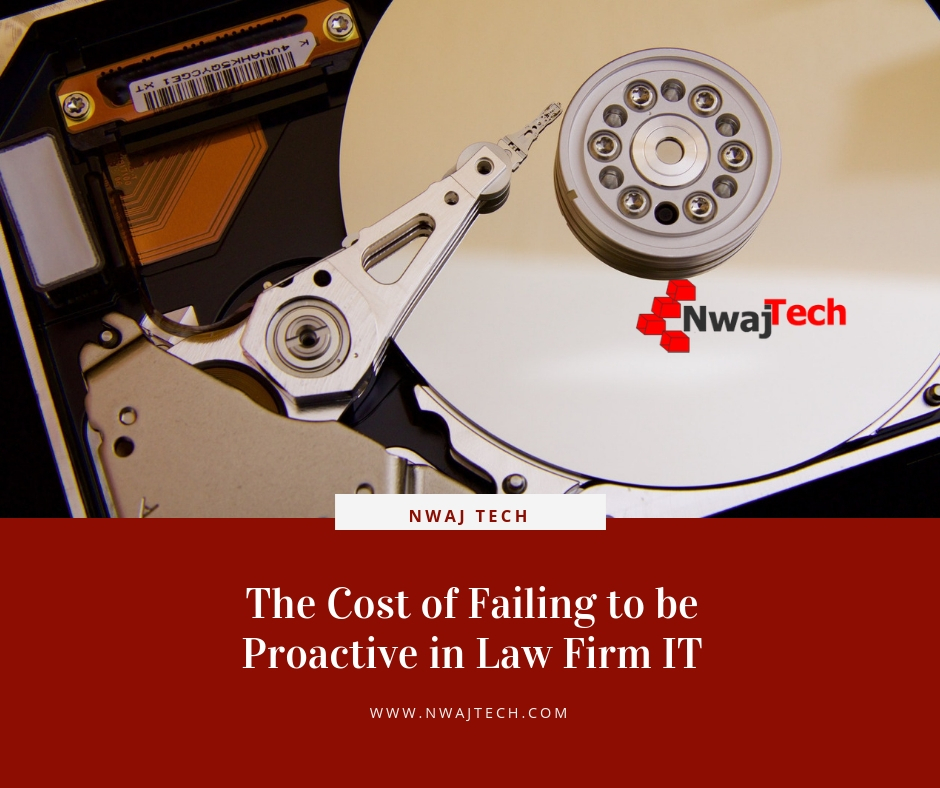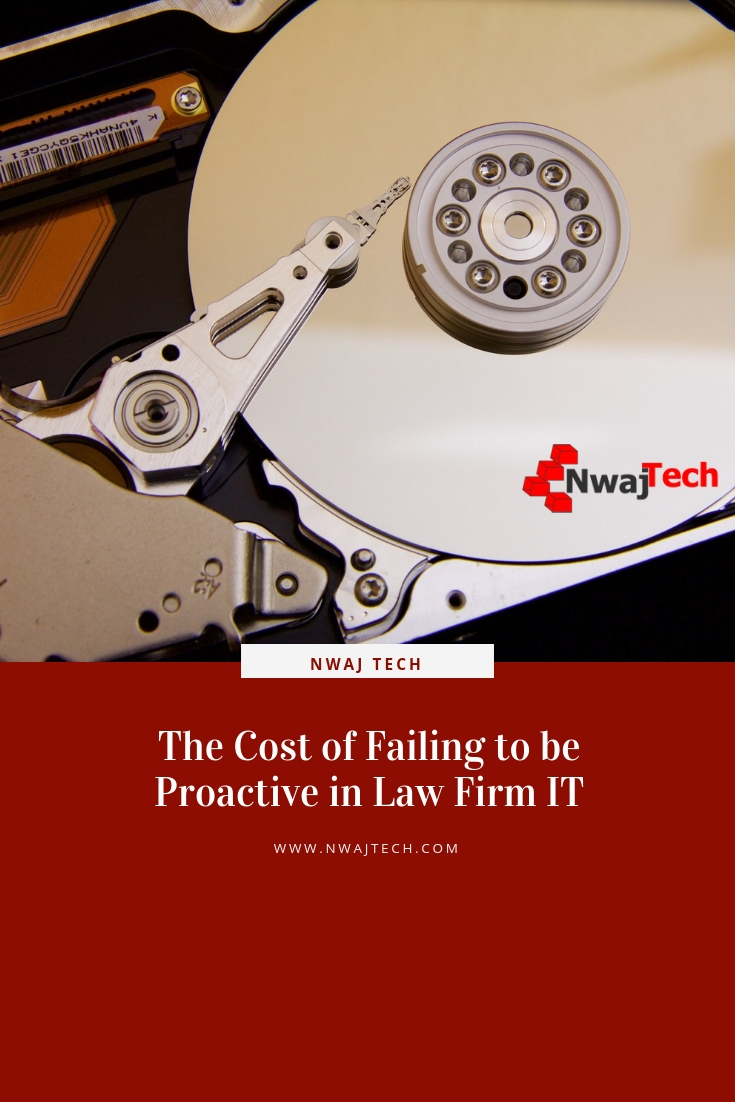
The Cost of Failing to be Proactive in Law Firm IT
Law Firms in Connecticut, and in many other states, are required to keep many records for seven years after said law firm ceases to represent a client.
Lawyers know this and many practice this religiously, but as we learned recently not all lawyers in Connecticut ensure their files and documents are secured for seven years.
A Lawyer Needed IT Support Immediately
It was a wintry day in New England not too long ago. There was snow and ice, wind and temperatures below 20 degrees. It was the type of day we typically expect not to get too many calls as most businesses were closed.
Only we did receive a call. A lawyer not too far from our location had an issue with his computer. The computer was no longer operational, and the lawyer wanted to recover the files from the computer.
This lawyer did not have a backup of their documents on the computer. We advised the lawyer that best efforts would be made to recover the files but physical damage to the hard drive may prevent that.
Sure enough, the hard drive was damaged physically. As soon as we racked it we heard the all too familiar clicking sound. The drive was not accessible using normal methods.
Once a hard drive is physically damaged normal methods of data recovery are no longer feasible. Data recovery can only be done (maybe) by data recovery specialists. The drive must be taken apart in a clean room (dust free) by someone who specializes in this type of work.
 This type of data recovery typically costs thousands of dollars, and there are not many companies that do this in the US. It also takes some time (usually weeks) to complete the work and get the data back to the client.
This type of data recovery typically costs thousands of dollars, and there are not many companies that do this in the US. It also takes some time (usually weeks) to complete the work and get the data back to the client.
During this time the law firm is at risk because they have not made efforts to retain the client files and documents for seven years. This puts their compliance at risk.
This is one example of what could go wrong with your law firm files. There are numerous other ways files can be lost including:
- Employee Error
- Ransomware/Malware
- Theft
- Lost or Stolen Laptop/Hardware
- Social Engineering
How Can Lawyers Protect Their Case Files?
We wish this was a unique case but it’s not.
There are multiple ways this could have been prevented. Here are a few ways:
- The least effective way is to use an external hard drive to back up your files locally. This method is least desirable as it still leaves the files locally accessible. In the event of a natural disaster, the files would be lost. This also does not protect you in the event of ransomware if the external hard drive is connected at the time your computer falls victim to a ransomware attack.
- Use backup/restore software. There are multiple vendors that automatically backup the documents on your computer(s) to the cloud. This solution is a much better solution as it covers you in the event of a natural disaster, ransomware or other malicious attacks.
- Our favorite solution is to automatically save your law firm files to the cloud. Using services like AWS S3 you can emulate a file server on Amazon. If properly set up your law firms files will be secure from anything that can cause lost data. AWS S3 can be redundant and can also be set up to automatically archive files that are no longer active. Transporting the files and storage is secure from hacking and theft. Files are accessible to authorized employees anywhere. They don’t need to be in the office (unless you want it that way) to access the files.
- Finally, the truly best option is to combine two or more of these options. This further decreases the likelihood you will lose files.
 Getting your law firm set up on a comprehensive data backup plan is critical to your reputation and your business. In the data age, it only takes one publicized incident to damage your business beyond repair.
Getting your law firm set up on a comprehensive data backup plan is critical to your reputation and your business. In the data age, it only takes one publicized incident to damage your business beyond repair.
Let Nwaj Tech review your IT Infrastructure. We’ll identify opportunities within your IT that should be addressed.
And don’t forget to encrypt your data!










Sound advice for sure – I can’t even imagine being in a business like that and losing your files – horrific. Backing up is a crucial step in business.
I think I am guilty of over backing up…
These are great tips. It would be terrible to lose your files! I would be panicking that’s for sure. I always try to keep my stuff safe online.
Great advice, you never know when you might be in need for this info will share it with my cousin, who is totally interested.
Making sure that all your files are safe is a very important thing. I sometimes tend to overreact, and back up my work too often!
Guilty as charged
Thank you so much for the heads up and suggestions on how to avoid that kind of situation. Noted on this tips!
I learned quite a while, after a similar experience that I need to always backup my work. However, now it has turned me into a bit of an obsessive backer upper…lol!
These are some great tips! Although, this topic is a little bit foreign to me. I’ll try to follow your tips to avoid future problems! 🙂
Wow that sounds like a definite nightmare. I can’t even imagine if I lost my blogging files let alone all of that. Great tips.
Great advise. Knowing the price of failiture it is always easier to maneuver and work harder.
Thanks for the tips. I’m kind of obsessive regarding the safety of my files, I think I have like 2-3 backups. One physical and one on the cloud.
This might sound weird but this post stressed me out!! You should always back-up your work especially when you have requirements for holding files for a certain amount of time. I am soooo glad I am NOT that lawyer. Yikes!
Every field nowadays is taking up technological solutions including the law field. Anyway, backing up case files in the cloud is so convenient and risk free; I’d go for that too.
Good to know hot to void that kind of things! Thanks for sharing it I hope my files are safe
I think backing up files has revolutionized how we save files: excellent and very informative article, thanks for sharing.
Whatever you are doing you definitely need to think about how you are backing up your files. I do like the cloud kind of. I feel a little nervous that my stuff is given control to someone else.
To be honest, I cannot understand the legal language but this is a verh useful and informative post. Thanks for sharing
Awesome tips! I would HATE to lose all of my files. Thanks so much for sharing!!
This is very informational & very helpful! Thank you so much for sharing!